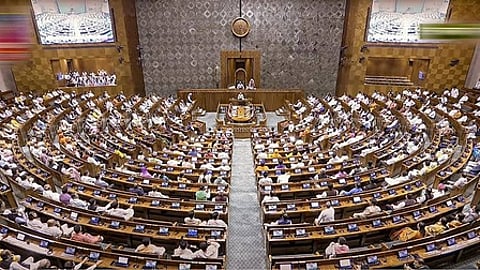

Leader of the House in the Rajya Sabha JP Nadda on Thursday accused the Opposition of spreading a fake narrative against the Waqf (Amendment) Bill.
Participating in a debate on the bill in the RS, Nadda accused the Congress of making Muslim women second-grade citizens during its rule at the Centre. He said the Narendra Modi government brought Muslim women into the mainstream by banning the practice of triple talaq.
Drawing a comparison, Nadda said the current government formed a 31-member JPC while the UPA had a 13-member JPC. He said 284 stakeholders participated in the debate this time, while only 18 debated during the UPA’s dispensation.
“Our government, under the leadership of PM Narendra Modi, follows democratic norms… Sole purpose of the bill is to bring reforms in managing waqf properties,” he said. Nadda said Muslim countries like Turkiye, Malaysia, and Saudi Arabia, among others, made different laws to bring Waqf properties under state control so that they could be utilised for the welfare and development of the community.
He said the Modi government operates under the mantra of ‘Sabka Saath, Sabka Vikas’ and has introduced schemes to benefit people from all sections of society.
RJD MP Manoj Kumar Jha questioned the content and intent of the waqf bill, suggesting that it be sent back to a select committee of Parliament.
Jha accused the government of using the bill as a form of “dog whistle politics” aimed at alienating Muslims from the mainstream. He pointed out incidents such as calls for economic boycott, searching of items inside old mosques, and attacks on places of worship, which he claimed were creating fear within a community that is already marginalised.
“In such an environment, the content and intent of your Bill raises questions,” Jha said. “Majority (of a party) in the House is not a wisdom mark, and all of us have come here after being elected by someone.”
Jha alleged that government’s actions were attempting to disturb the unity between Hindus, Muslims, Sikhs, and Christians in India, communities that have historically coexisted peacefully. On the provision for the nomination of non-Muslims to waqf board, he said he would appreciate such provisions being extended to all religious institutions, not just those within the Islamic community. “If you have put this in the Islamic community, then put this in Hindu, Sikh, Christian too... have you decided that all experiments would be with Muslims,” Jha questioned.
Senior advocate and Congress MP Abhishek Manu Singhvi, speaking during a debate on the Waqf (Amendment) Bill 2025 on Thursday, pointed out that the Bill has removed the concept of “Waqf by User,” at least prospectively, which would prevent Waqf from being created based on uninterrupted usage over a significant period of time.
He further said, “On the other hand, the applicability of the Limitation Act, if this Bill is passed, has inversely and conversely allowed the government, quasi-governmental bodies, and others outside the community to lay claim over a real Waqf property on the basis of uninterrupted and continued possession beyond 12 years, so long as litigation is not started prior to that.”
According to Singhvi, this provision enables the usurpation of property under the principle of adverse possession. He explained that if the government, any similar entity, or an individual outside the community remains in hostile possession of any Waqf property for a period of 12 years without legal dispute, they could then claim title to that property. Singhvi accused the government of attempting to further its own agenda by weakening the protection of Waqf properties with one hand, while simultaneously expanding its power to permanently claim these properties with the other. “This is a deliberate attempt by the government to further its own agenda,” he said.
AAP MP Sanjay Singh described the bill as contrary to the principles of the Constitution. Taking a dig at the BJP, Singh remarked that a party with no MP from the minority community cannot be considered a well-wisher of Muslims. He accused the Modi government of attempting to control Muslim religious bodies through legislation.
A commotion ensued when Singh criticised the BJP, referring to the donations collected for the Ram temple. He claimed the government was undermining the essence of the Constitution. Refuting the claim that the Bill was introduced for welfare of Muslims, Singh pointed out that there is no minister from the community in the government; the BJP had ended the careers of prominent Muslim leaders Shahnawaz Hussain and Mukhtar Abbas Naqvi, Singh said. “But they are talking about the welfare of Muslims,” Singh jibed.
He alleged that the Bill had violated the Constitution and was aimed at seizing religious properties. Singh accused the government of treating one community unfairly, adding that the Bill was designed to create unrest. He reminded the House that in a 2020 affidavit to the Supreme Court, the Centre admitted that 99% Waqf properties had been digitised; “When all Waqf property is digitised, then why are you bringing the Bill?” Singh said.